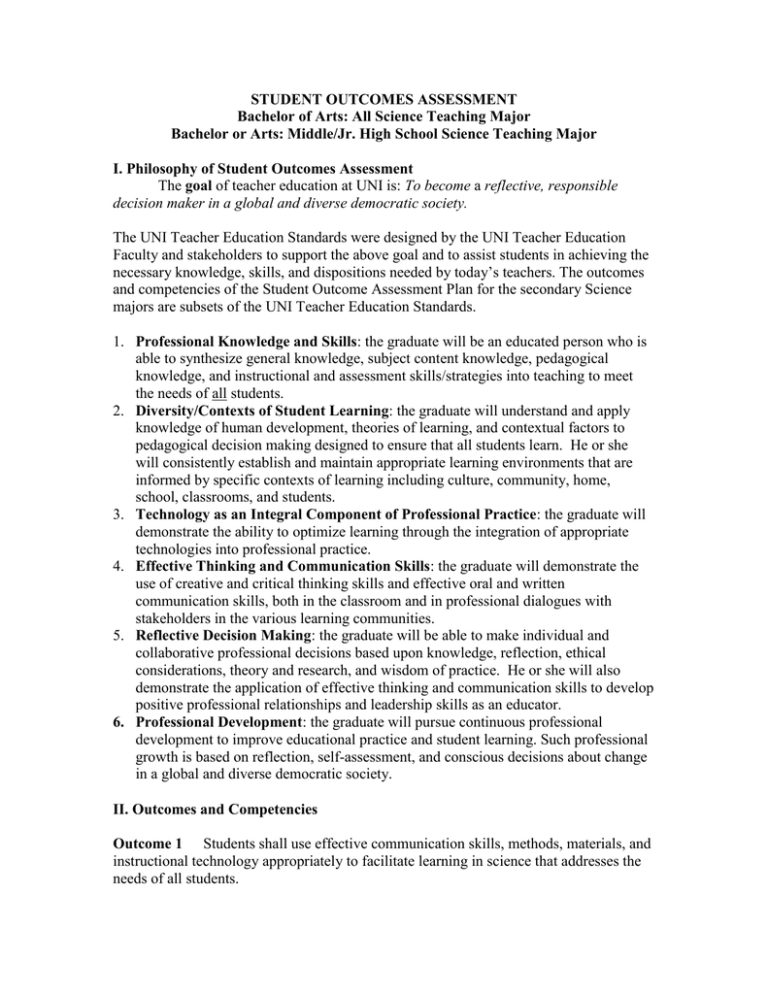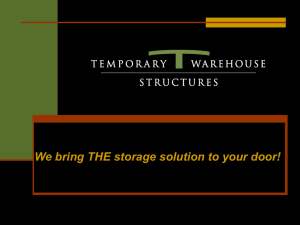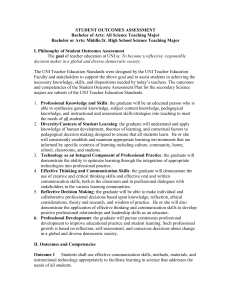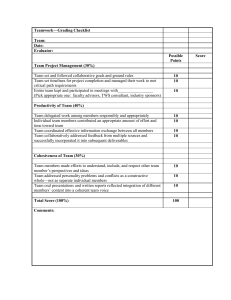STUDENT OUTCOMES ASSESSMENT Bachelor of Arts: All Science Teaching Major
advertisement

STUDENT OUTCOMES ASSESSMENT Bachelor of Arts: All Science Teaching Major Bachelor or Arts: Middle/Jr. High School Science Teaching Major I. Philosophy of Student Outcomes Assessment The goal of teacher education at UNI is: To become a reflective, responsible decision maker in a global and diverse democratic society. The UNI Teacher Education Standards were designed by the UNI Teacher Education Faculty and stakeholders to support the above goal and to assist students in achieving the necessary knowledge, skills, and dispositions needed by today’s teachers. The outcomes and competencies of the Student Outcome Assessment Plan for the secondary Science majors are subsets of the UNI Teacher Education Standards. 1. Professional Knowledge and Skills: the graduate will be an educated person who is able to synthesize general knowledge, subject content knowledge, pedagogical knowledge, and instructional and assessment skills/strategies into teaching to meet the needs of all students. 2. Diversity/Contexts of Student Learning: the graduate will understand and apply knowledge of human development, theories of learning, and contextual factors to pedagogical decision making designed to ensure that all students learn. He or she will consistently establish and maintain appropriate learning environments that are informed by specific contexts of learning including culture, community, home, school, classrooms, and students. 3. Technology as an Integral Component of Professional Practice: the graduate will demonstrate the ability to optimize learning through the integration of appropriate technologies into professional practice. 4. Effective Thinking and Communication Skills: the graduate will demonstrate the use of creative and critical thinking skills and effective oral and written communication skills, both in the classroom and in professional dialogues with stakeholders in the various learning communities. 5. Reflective Decision Making: the graduate will be able to make individual and collaborative professional decisions based upon knowledge, reflection, ethical considerations, theory and research, and wisdom of practice. He or she will also demonstrate the application of effective thinking and communication skills to develop positive professional relationships and leadership skills as an educator. 6. Professional Development: the graduate will pursue continuous professional development to improve educational practice and student learning. Such professional growth is based on reflection, self-assessment, and conscious decisions about change in a global and diverse democratic society. II. Outcomes and Competencies Outcome 1 Students shall use effective communication skills, methods, materials, and instructional technology appropriately to facilitate learning in science that addresses the needs of all students. Students shall: Competency 1.1 Understand issues in secondary science classrooms with respect to instructional strategies, assessment, planning and management that address current national and state initiatives in science education. Competency 1.2 Understand philosophies, methods, and materials for teaching secondary physical sciences, including Earth/space science, and/or secondary life science. Competency 1.3 Be able to select, use, and evaluate innovative instructional materials and resources (including those that are technology-based involving the computer or video) in an appropriate manner that is consistent with current national and state initiatives in science education. Competency 1.4 Demonstrate proficiency in the use of creative and critical thinking skills and effective oral and written communication skills to facilitate a positive learning environment for all students. Outcome 2 Students will apply the above outcomes and competencies through appropriate field experiences and reflective practice. Students shall: Competency 2.1 Be able to synthesize and interpret information in the required science disciplines. Competency 2.2 Be able to successfully diagnosis student characteristics and needs and successfully modify instructional practice as required based on characteristics and needs of all students. Competency 2.3 Demonstrate the ability to apply the above competencies directly in a classroom setting through participation in required field experiences for Level III (methods) classes. Competency 2.4 Successfully complete the student teaching experience. Measurement of Competencies Competency 1.1 Assessment Successful completion of Teacher Work Sample (TWS) in science teaching methods classes with a rating of 2 or better on the TWS assessment rubric; successful ratings on the Secondary Methods Assessment Rubric 1.2 Successful completion of a TWS in Current Curricula courses with a rating of 2 or better on the TWS Assessment Rubric; successful ratings on the Secondary Methods Assessment Rubric 1.3 Successful completion of a TWS in Current Curricula courses with a rating of 2 or better on the TWS Assessment Rubric; successful ratings on the Secondary Methods Assessment Rubric 1.4 Successful completion of a TWS in Current Curricula courses with a rating of 2 or better on the TWS Assessment Rubric; successful ratings on the Secondary Methods Assessment Rubric 2.1 Successful completion of a TWS in Current Curricula courses with a rating of 2 or better on the TWS Assessment Rubric; successful ratings on the Secondary Methods Assessment Rubric 2.2 Successful completion of a TWS in Current Curricula courses with a rating of 2 or better on the TWS Assessment Rubric; successful ratings on the Secondary Methods Assessment Rubric 2.3 Successful completion of a TWS in science teaching methods classes with a rating of 2 or better on the TWS Assessment Rubric; successful ratings on the Secondary Methods Assessment Rubric; successful completion of the Professional Teaching Portfolio 2.4 Student Teaching evaluations by Cooperating Teacher and Student Teaching Coordinator; evaluation of Teacher Work Sample during Student Teaching.



